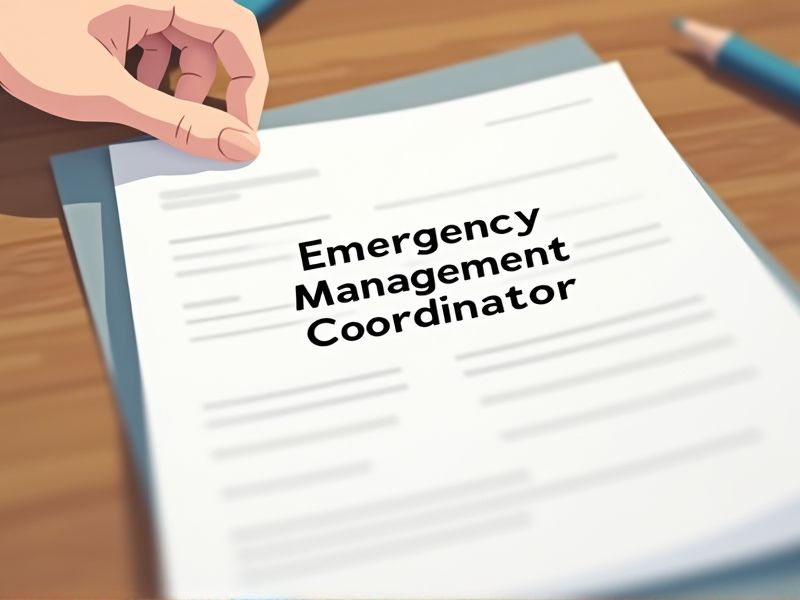
Emergency Management Coordinators play a crucial role in planning for and responding to disasters, requiring a well-rounded skill set. Certifications provide standardized training and knowledge, ensuring coordinators possess the necessary expertise in crisis management techniques. These credentials also establish credibility among partners and stakeholders, enhancing trust and communication. Consider these important certifications for an Emergency Management Coordinator.
Certified Emergency Manager (CEM)
Certified Emergency Managers possess validated skills and knowledge essential for effectively coordinating complex emergency response efforts. Their certification ensures they are updated with the latest best practices, which enhances the community's resilience in crises. Employing a CEM leads to improved resource management and strategic planning during emergencies. Their expertise facilitates seamless collaboration among agencies, crucial for minimizing disaster impact.
Associate Emergency Manager (AEM)
An Associate Emergency Manager (AEM) plays a critical role in augmenting the capabilities of an Emergency Management Coordinator by providing specialized expertise in risk assessment and response strategies. Their presence facilitates a more efficient allocation of resources and personnel during emergencies, thus enhancing overall operational readiness. AEMs contribute significantly to training programs, ensuring preparedness at all levels of the organization. Coordination between an AEM and an Emergency Management Coordinator ensures a streamlined communication process, vital for effective crisis management and recovery efforts.
National Incident Management System (NIMS) Certification
National Incident Management System (NIMS) Certification ensures that Emergency Management Coordinators can implement standardized procedures during a crisis, improving coordination and communication among various agencies. This certification equips professionals with the necessary skills to manage resources efficiently, reducing response time and enhancing overall effectiveness in emergency situations. The training required for NIMS Certification prepares coordinators to handle different types of incidents, from natural disasters to man-made crises, ensuring a flexible response approach. Having certified personnel is often a requirement for receiving federal funding for emergency management programs, aligning local preparedness efforts with national standards.
Incident Command System (ICS) Certification
Emergency Management Coordinators need ICS Certification because it provides a standardized organizational structure essential for efficient communication and coordination during emergencies. It enhances interoperability among agencies, ensuring that all involved parties understand their roles and responsibilities. The certification also strengthens leadership skills necessary to manage resources effectively during crises. Without ICS Certification, coordinators may struggle to implement consistent, strategic responses, reducing the overall effectiveness of emergency management efforts.
Master Exercise Practitioner (MEP) Certification
Achieving Master Exercise Practitioner (MEP) Certification equips an Emergency Management Coordinator with advanced skills in designing, conducting, and evaluating disaster exercises. This certification enhances their ability to identify gaps in emergency plans, leading to improved disaster response strategies. Gaining MEP certification fosters collaboration with local, state, and federal agencies, ensuring a coordinated emergency response. Documented proficiency through MEP certification also strengthens the coordinator's credibility and trust among stakeholders.
FEMA Professional Development Series Credential
The FEMA Professional Development Series Credential equips Emergency Management Coordinators with essential skills and knowledge for effective disaster response. Enhanced competency through this credential leads to improved decision-making during crises. Credentialed professionals often gain increased trust and collaboration with federal, state, and local agencies. Comprehensive training provided by the credential ensures coordinators can develop and implement effective emergency plans.
Public Information Officer (PIO) Certification
The PIO Certification equips Emergency Management Coordinators with essential communication skills for effectively disseminating critical information during crises. Proper training reduces misinformation, ensuring the public receives accurate and timely updates. This certification enhances credibility and trust with communities and media outlets. By having standardized protocols, coordinators can more efficiently coordinate responses, minimizing chaos and confusion.
Critical Incident Stress Management (CISM) Certification
Critical Incident Stress Management (CISM) Certification equips Emergency Management Coordinators with essential skills to address and mitigate stress reactions following traumatic events. Trained coordinators can effectively support first responders and victims, enhancing recovery and reducing long-term psychological impacts. Without CISM, coordinators may lack the tools to manage stress critical engagement areas, leading to potential burnout or ineffective intervention strategies. Certification ensures alignment with best practices, promoting resilience and optimal functioning in crisis situations.
Hazardous Materials (HazMat) Awareness Certification
Emergency Management Coordinators need HazMat Awareness Certification to understand the potential risks associated with hazardous materials and effectively mitigate their impact on the community. Certification equips them with the knowledge to identify hazardous substances and recognize warning signs in emergency situations. This awareness is crucial for developing response plans that ensure public safety and resource allocation during hazardous incidents. Proper training reduces the potential for harm by enhancing the coordinator's ability to communicate and coordinate with specialized HazMat response teams.
Project Management Professional (PMP) Certification
PMP certification enhances an Emergency Management Coordinator's ability to plan and execute projects within constraints, aligning resources effectively during crises. The structured methodology from PMP aids in risk assessment and management, crucial for emergency scenarios where uncertainty prevails. It facilitates improved communication skills and stakeholder management, ensuring cohesion among diverse emergency response teams. Having a PMP certification can increase an individual's competitive edge and credibility, demonstrating a commitment to adhering to standardized project management practices.
Summary
You can expect improved efficiency in emergency response when an Emergency Management Coordinator obtains certifications. These credentials often lead to enhanced skills and knowledge, which streamline operations during crises. The community benefits from more effective resource management and quicker recovery times as a result. This in turn can increase public trust and confidence in local emergency management efforts.
